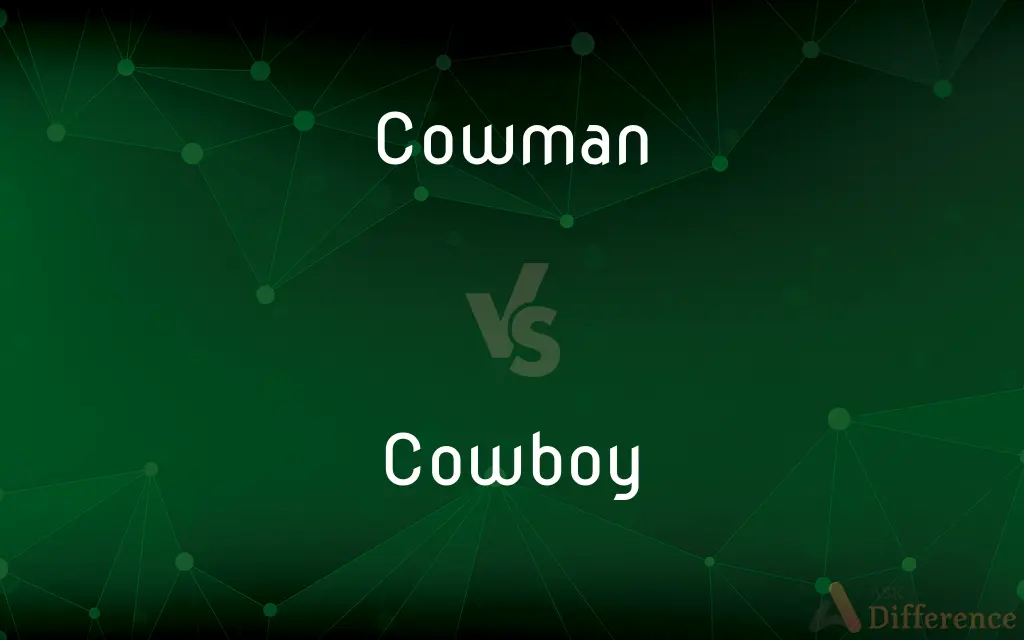Cowman vs. Cowboy — What's the Difference?
By Urooj Arif & Fiza Rafique — Updated on April 2, 2024
A cowman owns or manages cattle ranches, focusing on the business aspects, while a cowboy works on these ranches, handling the physical tasks related to cattle.

Difference Between Cowman and Cowboy
Table of Contents
ADVERTISEMENT
Key Differences
Cowmen are ranchers or cattle operators who own or manage cattle ranches. They are responsible for the overarching management tasks, including financial decisions, breeding strategies, and land management. Cowboys, on the other hand, are the hands-on workers on a ranch, involved in day-to-day activities such as herding, branding, and caring for cattle. They execute the plans laid out by cowmen.
While cowmen are often seen as the business minds behind cattle ranching, making strategic decisions to ensure profitability and sustainability, cowboys focus more on the operational side. Cowboys possess skills in riding, roping, and other ranch-related tasks, which are critical for the practical aspects of cattle ranching. Cowmen may have these skills too, but their primary role revolves around management.
Cowmen typically invest in the land, cattle, and equipment necessary for running a ranch. They may negotiate sales, purchase feed, and manage ranch employees. Cowboys, while they may own horses or personal gear, generally do not have the same level of investment in the ranch's infrastructure. Their expertise lies in the care and management of the cattle, under the direction of the cowmen.
In terms of employment, cowmen are self-employed or own their business entities. They might employ several cowboys depending on the size of their ranch. Cowboys are usually employees or contractors who work for cowmen, providing their labor in exchange for wages. This employment structure underscores the different roles and responsibilities on a ranch.
The relationship between cowmen and cowboys is symbiotic. Cowmen rely on cowboys to implement their ranching strategies effectively, ensuring the health and productivity of the livestock. Conversely, cowboys depend on cowmen for employment opportunities and the resources needed to perform their jobs effectively. This interdependency highlights the different yet interconnected roles within the cattle ranching industry.
ADVERTISEMENT
Comparison Chart
Role
Owns or manages cattle ranches, focusing on business and management.
Works on cattle ranches, handling daily tasks related to cattle.
Responsibilities
Oversees financial decisions, breeding, and land management.
Involved in herding, branding, and caring for cattle.
Skills
Strategic planning, financial management, and possibly some ranching skills.
Riding, roping, and other practical ranching skills.
Investment
Invests in land, cattle, and equipment.
May own personal gear but generally does not invest in ranch infrastructure.
Employment
Self-employed or business owner, employs cowboys.
Employee or contractor working for a cowman.
Compare with Definitions
Cowman
A cowman owns or manages a cattle ranch, focusing on the ranch's business aspects.
The cowman calculated the year's profits and planned for the next breeding season.
Cowboy
They follow the directives of the cowman to maintain ranch operations.
The cowboys gathered for instructions at dawn before starting their tasks.
Cowman
Cowmen employ cowboys to carry out the daily operations of the ranch.
Hiring skilled cowboys was crucial for the ranch's success.
Cowboy
A cowboy works on a ranch, performing tasks related to cattle care and management.
The cowboy spent the day herding cattle across the pasture.
Cowman
Cowmen make decisions about land use and cattle management.
He chose to rotate grazing fields to sustain land productivity.
Cowboy
Cowboys are skilled in horseback riding and roping.
His roping skills were essential during the cattle roundup.
Cowman
They invest in cattle ranching operations, including purchasing cattle.
The cowman attended an auction to buy additional stock.
Cowboy
Cowboys are involved in branding, vaccination, and feeding cattle.
Today's job involved branding the new calves.
Cowman
Cowmen navigate the financial aspects of ranching, from budgeting to marketing.
The cowman developed a marketing strategy for his premium beef products.
Cowboy
The life of a cowboy is marked by long hours and physical labor outdoors.
Despite the long hours, he found satisfaction in cowboy life.
Cowman
An owner of cattle or a cattle ranch.
Cowboy
A cowboy is an animal herder who tends cattle on ranches in North America, traditionally on horseback, and often performs a multitude of other ranch-related tasks. The historic American cowboy of the late 19th century arose from the vaquero traditions of northern Mexico and became a figure of special significance and legend.
Cowman
See cowboy.
Cowboy
(especially in the western US) a man who herds and tends cattle, performing much of his work on horseback
They are always playing cowboys and Indians
Cowman
A cowherd.
Cowboy
A dishonest or careless person in business, especially an unqualified one
Cowboy coach firms are alleged to have flouted safety rules
Cowman
Cattle rancher
Cowboy
Work as a cowboy.
Cowman
Cattleman
Cowboy
A hired man, especially in the western United States, who tends cattle and performs many of his duties on horseback. Also called cowman; also called regionally buckaroo, vaquero, waddy2. See Note at buckaroo
Cowman
A hired hand who tends cattle and performs other duties on horseback
Cowboy
An adventurous hero.
Cowboy
(Slang) A reckless person, such as a driver, pilot, or manager, who ignores potential risks.
Cowboy
A man who tends free-range cattle, especially in the American West.
Cowboy
A man who identifies with cowboy culture, including wearing a cowboy hat and being a fan of country and western music.
Cowboy
(informal) A person who engages in reckless behavior, especially for the purpose of showing off.
Cowboy
A dishonest and/or incompetent independent tradesman.
Cowboy
A playing card of king rank.
Cowboy
(uncountable) cowboy pool
Cowboy
(intransitive) To work as a cowboy, herding cattle.
Cowboy
A cattle herder; a drover; specifically, one of an adventurous class of herders and drovers on the plains of the Western and Southwestern United States.
Cowboy
One of the marauders who, in the Revolutionary War infested the neutral ground between the American and British lines, and committed depredations on the Americans.
Cowboy
A hired hand who tends cattle and performs other duties on horseback
Cowboy
A performer who gives exhibitions of riding and roping and bulldogging
Cowboy
Someone who is reckless or irresponsible (especially in driving vehicles)
Common Curiosities
What is a cowman?
A cowman is someone who owns or manages a cattle ranch, focusing on its business and strategic aspects.
What skills are necessary for a cowman?
A cowman needs skills in business management, strategic planning, and understanding of cattle ranching operations.
How are cowboys employed?
Cowboys are typically employed by cowmen as part of the labor force needed to manage and care for cattle on a ranch.
What does a cowboy do?
A cowboy works on a cattle ranch, handling the physical tasks related to cattle care, herding, and management.
Can a cowboy become a cowman?
Yes, a cowboy can become a cowman, often through gaining experience, acquiring land, and starting their own ranching operations.
How do cowmen and cowboys work together?
They work together through a hierarchical structure, with cowmen making strategic decisions and cowboys executing the day-to-day tasks.
What kind of lifestyle can a cowboy expect?
A cowboy can expect a lifestyle marked by significant physical labor, long hours, and a deep connection to the outdoors and cattle.
What is the most rewarding aspect of being a cowboy?
Many cowboys find the connection with animals, nature, and the sense of accomplishment in their work to be the most rewarding aspects.
Do cowmen work on the ranch alongside cowboys?
While cowmen may occasionally work alongside cowboys, their primary focus is on managing and making decisions for the ranch.
What are the main responsibilities of a cowboy?
The main responsibilities include herding, branding, feeding, and overall care of the cattle, along with maintenance of ranch equipment.
Is cattle ranching a viable career today?
Yes, cattle ranching remains a viable career, with opportunities in both ranch management and operational roles.
How do cowmen plan for the future of their ranches?
Cowmen plan by adapting to market demands, implementing sustainable practices, and investing in the next generation of ranchers and technology.
How has technology impacted cattle ranching?
Technology has introduced efficiencies in tracking, health management of cattle, and operations, affecting both cowmen and cowboys.
What challenges do cowmen face?
Challenges include market fluctuations, environmental concerns, and managing the health and productivity of their livestock.
What education is required to be a cowman?
While formal education in agriculture or business can be beneficial, practical experience and knowledge of the ranching industry are crucial.
Share Your Discovery

Previous Comparison
Localized vs. Localised
Next Comparison
Biphasic vs. DiphasicAuthor Spotlight
Written by
Urooj ArifUrooj is a skilled content writer at Ask Difference, known for her exceptional ability to simplify complex topics into engaging and informative content. With a passion for research and a flair for clear, concise writing, she consistently delivers articles that resonate with our diverse audience.
Co-written by
Fiza RafiqueFiza Rafique is a skilled content writer at AskDifference.com, where she meticulously refines and enhances written pieces. Drawing from her vast editorial expertise, Fiza ensures clarity, accuracy, and precision in every article. Passionate about language, she continually seeks to elevate the quality of content for readers worldwide.
















































